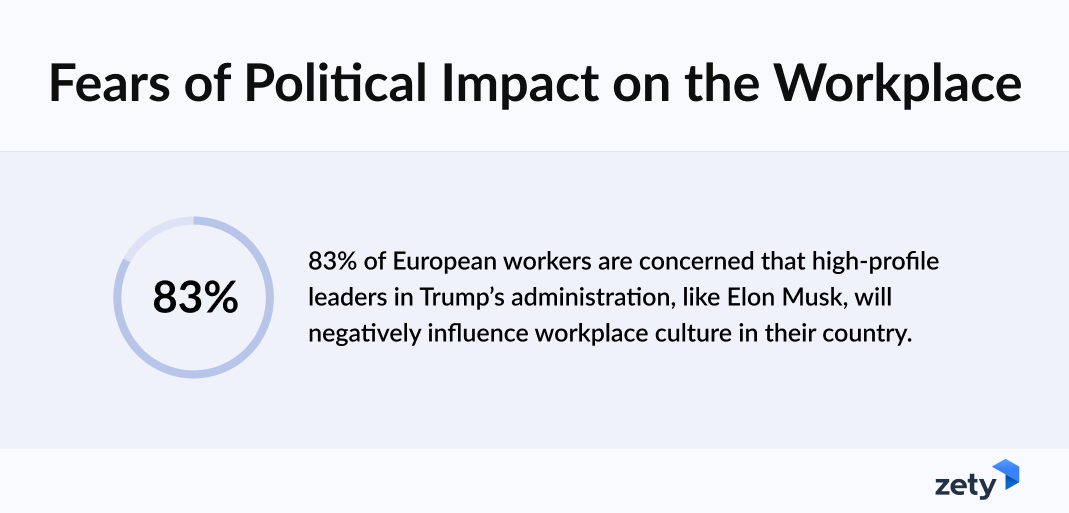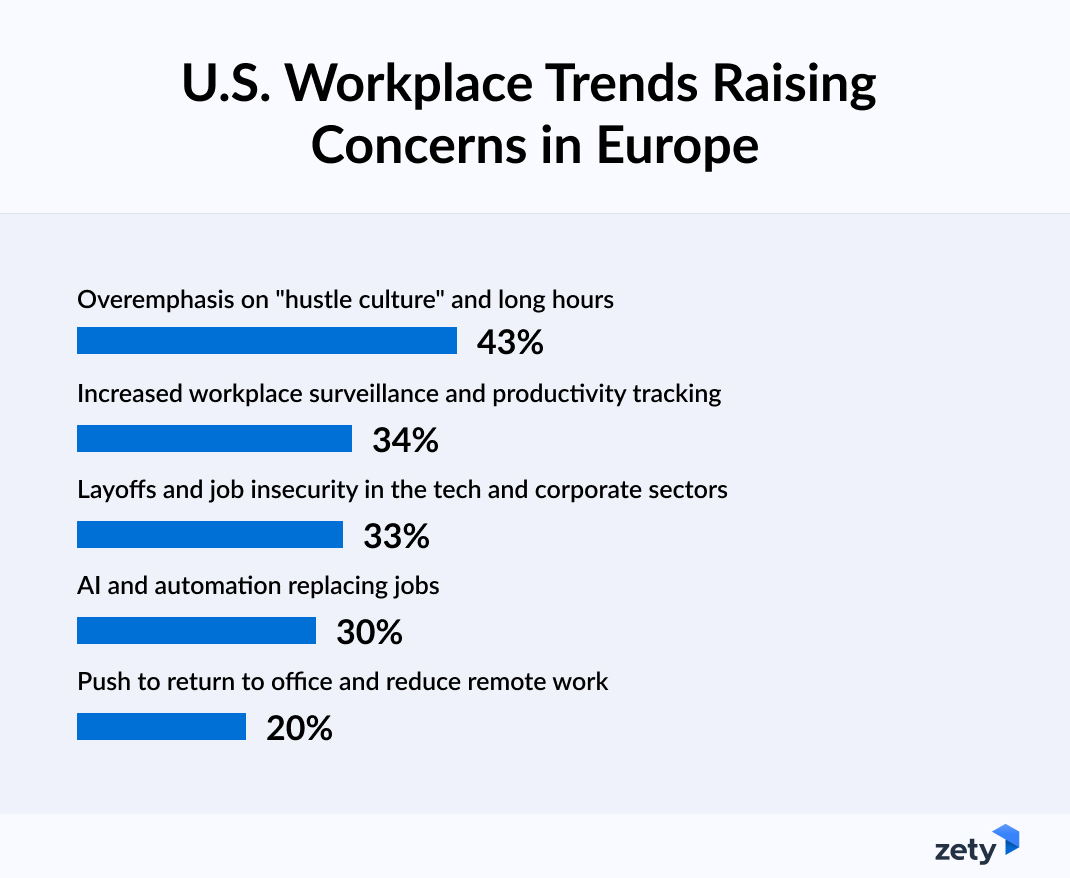
From longer work hours to fewer holidays and increased surveillance, U.S. workplace trends are making their way into European offices—and not everyone is happy about it.
Zety’s Pan European Report surveyed 1,000 employees across the UK, France, Germany, Italy, and Spain. The data reveals widespread concern that influential U.S. business leaders and shifting global norms are eroding long-held labor protections, disrupting work-life balance, and threatening mental health. Many workers are so alarmed that they'd quit if these changes came to their workplace.
Key findings
- Anxiety from growing U.S. influence: 86% of Europeans believe U.S. corporate culture is influencing European companies more than in previous years.
- Threats to well-being: 78% worry that U.S. corporate practices could threaten strong labor laws, impacting work-life balance and holiday time—76% believe adopting America’s “always-on” work culture would worsen their mental health.
- Call to strengthen European labor laws: 68% support stronger labor protections in response to the increasing adoption of U.S.-style workplace policies.
- Concerns over American workplace trends: One-third (34%) are worried about increased workplace surveillance and productivity tracking, while 1 in 5 (20%) are concerned about the push to return to office and reduce remote work.
- Recession fears high: 71% are worried about the impact of a possible U.S. recession on their own workplaces, reflecting the broader financial unease that U.S. economic trends are creating among European workers.
U.S. Corporate Influence: A Growing Concern in Europe
The growing presence of U.S. corporate and economic practices is sparking concern about potential threats to European labor rights, financial stability, and overall work-life balance.
- 86% believe U.S. workplace culture is influencing European companies more than in previous years, with 37% saying the influence is significantly stronger.
- 83% are concerned that high-profile leaders in Trump’s administration, like Elon Musk, will negatively influence workplace culture in their country.
- 78% worry that U.S. corporate practices could threaten strong labor laws, work-life balance, and holiday time.
- 71% worry about the impact of a possible U.S. recession on their own workplaces.
Here is a visualization of the data above:

European Workers Resist American Workplace Practices
Many European employees are resisting the adoption of American-style workplace norms, prioritizing labor protections and mental health.
- 95% emphasize the importance of keeping European labor laws independent from U.S. corporate influence.
- 59% consider protecting labor laws from U.S. influence a top priority.
- 68% support stronger labor laws in response to the increasing adoption of U.S.-style workplace policies.
- 34% would begin looking for a new job immediately if their company implemented U.S. workplace policies such as longer working hours, return-to-office mandates, weekly accountability reports, or fewer holidays.
What this means: There’s a strong cultural divide between European and American work norms, with European employees actively favoring policies that protect their time, rights, and autonomy at work.
Top U.S. Workplace Trends That Concern Europeans
Several trends in U.S. workplace culture are raising red flags for European workers.
- 43% are most concerned about the overemphasis on "hustle culture" and long hours.
- 34% are worried about increased workplace surveillance and productivity tracking.
- 33% fear layoffs and job insecurity in the tech and corporate sectors.
- 30% are concerned about AI and automation replacing jobs.
- 20% are troubled by the push to return to office and reduced remote work.
What this means: U.S. corporate habits are often perceived as invasive or unsustainable by European professionals, signaling a misalignment in values around how work should be structured and experienced.
Here is a visualization of the data above:

Mental Health and Work-Life Balance at Risk
Employees fear that adopting American-style workplace practices could lead to increased stress and burnout.
- 76% believe adopting a U.S.-style "always-on" work culture would worsen their mental health.
- 48% would consider leaving their job if their work-life balance were significantly affected by U.S.-style workplace policies.
What this means: The prospect of adopting U.S. work norms raises red flags about employee well-being, suggesting companies could face backlash if policies begin to blur boundaries between personal and professional life.
European Workers Have Minimal Interest in U.S. Work Culture
When asked what they found most appealing about U.S. work culture, European workers offered few positive responses.
- 42% cited higher salaries and performance-based pay—the most significant draw.
- 27% were interested in job opportunities within innovative industries.
- 24% valued the American entrepreneurial mindset and career mobility.
- Only 22% found the U.S. focus on individual achievement appealing.
What this means: Despite some economic appeal, American workplace culture lacks widespread admiration in Europe, with few aspects resonating enough to outweigh cultural and lifestyle priorities.
Methodology
The findings presented were obtained by surveying 1,000 workers across Italy, France, Spain, Germany, and the UK, gathering 200 respondents from each country. The survey was conducted on March 21, 2025, using Pollfish. Participants were queried about the influence of U.S. workplace trends in Europe, responding to various question types, including yes/no questions, scale-based questions gauging agreement levels, and questions that permitted the selection of multiple options from a list of answers.


